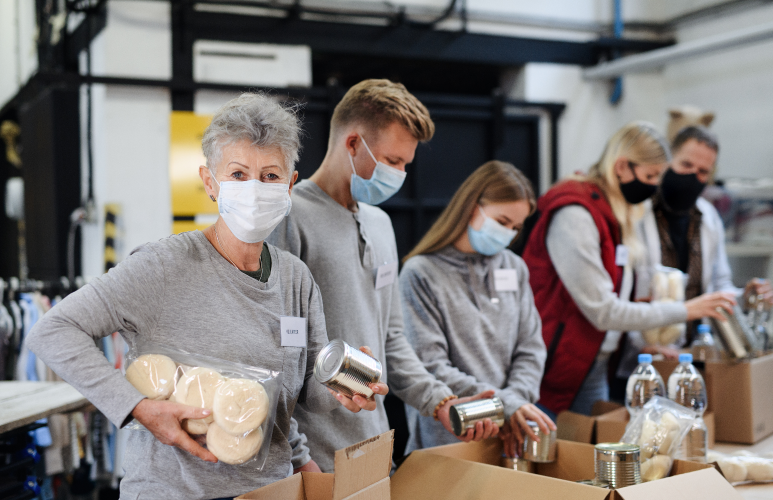Three nonprofits have joined together to rescue potentially discarded food, feed those in need and provide employment in San Diego. The organizations’ combined efforts have salvaged more than 500,000 pounds of food from local retailers while providing employment to 11 people.
The initiative was launched in April 2020 with a grant from the Lucky Duck Foundation, which raises and distributes funds to help San Diego’s homeless population. Food donation partners and truck routes are secured through the program’s third partner, Feeding San Diego, the local unit of a nationwide nonprofit that provides hunger relief and food rescue services.
The third partner, the Salvation Army’s San Diego Regional Office, received an initial grant of more than $100,000 for its food reclamation effort, which sends vans to pick up donations from retail partners. Drivers, who are selected from the organization’s clients, are paid $16 an hour — a dollar above California’s minimum wage. The positions are part-time positions, which can offer as few as five hours a week to a maximum of 26 hours a week, according to San Diego Regional Office Homeless Services Director Megan Dowell.
The immediate impact of the program brings food — baked goods, produce and dairy products are especially welcome — otherwise destined for trash bins to the Salvation Army’s food pantries. The drivers also receive training and coaching in work skills, such as being on time, working with a supervisor and being a diligent worker, all of which are used to build each driver’s resume.
The program employs five men — all the drivers to date have been men, which Dowell characterized as the luck of the draw. The program is viewed as offering temporary work: Drivers are expected to move on to more gainful employment after six months, although in at least one case a driver was kept on longer.
Since the start of the program, six more have graduated and gone on to other employment. One of the five currently employed had been a driver and is now with the San Diego Salvation Army’s Family Service’s unit, where he helps coordinate drivers and pickups.
Each pickup garners a minimum of 100 pounds of food, which is then brought to the Salvation Army’s food pantries in Escondido, Oceanside and downtown San Diego. Once there, collected food is intermingled with less-perishable staples such as rice, beans and pasta. Items are redistributed as collected: loaves of bread are not, for example, broken up and made into sandwiches.
After the initial donation, which was stretched over two years due to the coronavirus pandemic, the food reclamation program received an additional grant from Lucky Duck of, once again, slightly more than $100,000. The second grant will fund the program through February 2023. The effort is part of a $1 million initiative sponsored by Lucky Duck in January 2022. initially distributed $1 million among ten organizations providing employment and job training services for unhoused individuals.
The grants were part of an initiative from Lucky Duck’s leadership to create training and job opportunities for upward of 650 individuals, with a goal of helping participants emerge from homelessness via long-term employment. In addition to the Salvation Army, funded organizations include:
- Dreams’ Cuisine, a food truck social enterprise from Dreams for Change that provides job training, placement and case management for those facing high barriers to employment
- From the Grounds Up, a coffee shop staffed by young San Diegans and run by San Diego Youth Services which offers support and workplace training
- Pathways, a program from the San Diego College of Continuing Education which provides access to a variety of certificate and training programs, paid internships, case management, transportation and basic needs and work supplies
- Work for Hope, a program from McAlister Institute that gives on-the-job training and work stipends for neighborhood beautification and other projects throughout Chula Vista, as well as connecting participants with behavioral health, housing and job development services
- Thrift Boutique and Bright Futures Candles, two social enterprises from Home Start that offer employment readiness, job training skills and self-sufficiency support services for youths
- Work Readiness Exchange, the National Conflict Resolution Center’s life skills and conflict avoidance program
- Workforce Opportunities for Rebuilding through Knowledge and Skills (WORKS), an initiative from HomeAid San Diego that offers technical construction skills, soft skills and job opportunities
- A joint effort between Urban Street Angels and the Union of Pan Asian Communities that offers homeless youths job training and employment opportunities in culinary arts, graphic design and print production
- A pilot program from Adjoin, Veterans division that gives two months of mentoring, paid training, shadowing and support to veterans in their quests to become direct support professionals.
During the year ended Dec. 31, 2020, the most recent year for which Form 990s from Lucky Duck are available, the organization gave away a total of nearly $2 million in grants.
